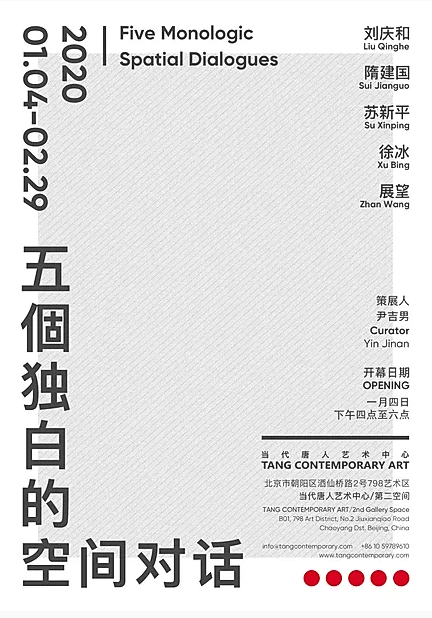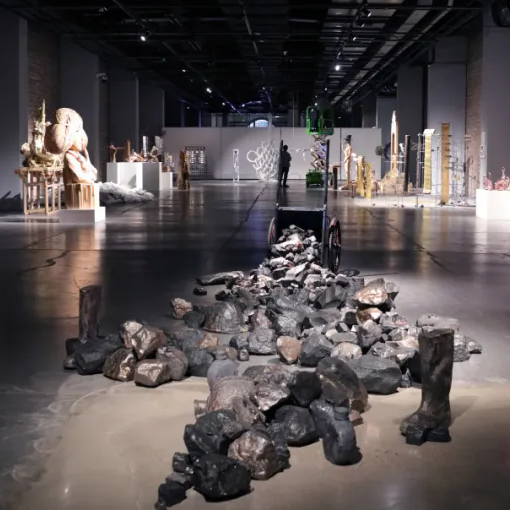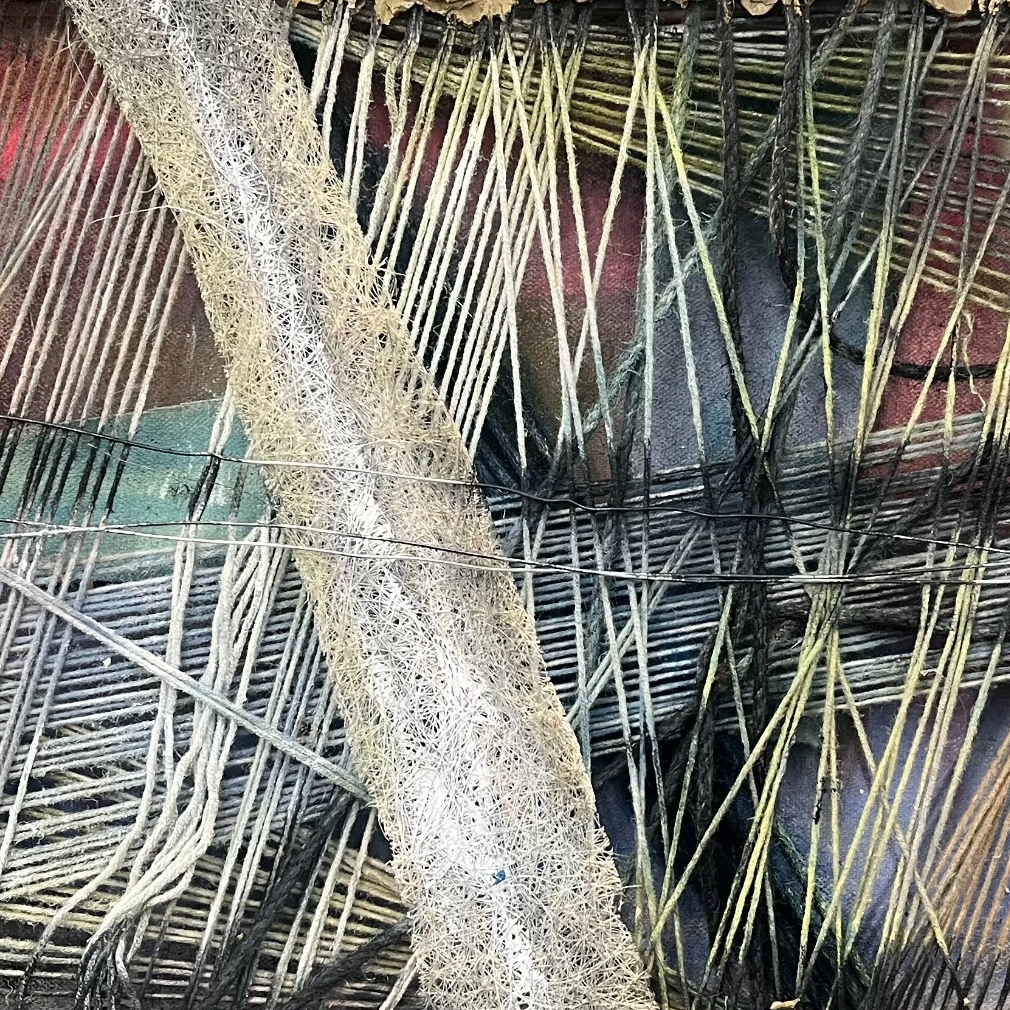
Tang Contemporary Art presents Five Monologic Spatial Dialogues, a group exhibition by the most important five contemporary artists in China: Liu Qinghe, Sui Jianguo, Su Xinping, Xu Bing, and Zhan Wang. Curated by Yin Ji’nan, the exhibition is shown in Tang Contemporary Art's second space in Beijing.
Five Monologic Spatial Dialogues
Yin Ji’nan
The human context has been globalized; although the trade dispute is not a substitute for a cold war, it has occupied our minds to a certain extent. We know that nationalism cannot replace internationalism, and realism cannot replace idealism. Of course, these pressing, real subjects cannot necessarily become perfect artistic subjects.
Spring Festival is coming close on the heels of the New Year, and between the international New Year and Chinese New Year, we have added this exhibition, placing five very distinctive artists in one space and creating dialogues in monologues and monologues in dialogues. Proposing an artistic idea that they can all agree upon is very difficult, but they have similar backgrounds and international cultural contexts, and they were all born in the 1950s and 1960s. They were witnesses to Reform and Opening and social transformation in China, and they were participants in Chinese contemporary art movements. They provided their own ideas and art forms.
The earliest thought behind this exhibition came from a book I edited, entitled How Do We Make Art Today? (Shandong Fine Arts Publishing House). It contained written statements from five artists, including Mao Xuhui from Yunnan and Chao Ge from Beijing. These statements were essentially monologues, and the ideals behind monologues hope to achieve understanding through dialogue. I hope that they can use tangible works of art, not words, to present monologues and
dialogues in the same space. Their dialogue with one another, their collective dialogue with the changing world, and their living dialogue with their souls provide an art form for spiritual and intellectual monologues.
January 2020, Beijing
About Curator
Yin Ji’nan is a professor at the Central Academy of Fine Arts. He is a noted art historian and contemporary art critic, and he is the editor-in-chief for the Joint Publishing book series Open Art History. He is currently the director of the Institute for the Advanced Studies of Images and History and the dean of the School of Art and Humanities, both at the Guangzhou Academy of Fine Arts.
About Artists
Liu Qinghe was born in 1961 in Tianjin. China. He received degrees from the Tianjin School of Arts and Crafts in 1981, and the Folk Art Department at the Central Academy of Fine Arts in 1987. he received his master’s degree from the Chinese Painting Department at the Central Academy of Fine Arts in 1989. He studied at the Academy of Fine Arts at the Complutense University of Madrid in 1992. He is currently a professor, graduate adviser, and the dean of the School of Chinese Painting at the Central Academy of Fine Arts.
Liu Qinghe has held solo exhibitions at the National Art Museum of China, the Beijing Fine Art Academy Museum, Today Art Museum, He Xiangning Art Museum, United Art Museum, and the University Museum and Art Gallery at the University of Hong Kong. He has also participated in group shows at Kunsthalle G?ppingen, Beijing Minsheng Art Museum, Power Station of Art, the Chazen Museum of Art, Cleveland State University, Conde Duque Madrid, and MODEM Debrecen. He was named Ink Artist of the Year at the Eighth AAC Awards, and he won the Shanghai Securities News Annual Golden Artist Prize. L’Officiel Art named him Ink Artist of the Year in 2013. His work has been added to important private and institutional collections around the world.
Su Xinping was born in 1960 in Jining, Inner Mongolia. In 1977, he joined the army, and in 1983, he graduated from the Painting Department at the Tianjin Academy of Fine Arts. In 1989, he received his master’s degree from the Printmaking Department at the Central Academy of Fine Arts, then stayed on at the academy to teach. He was previously the head of the Printmaking Department and the dean of the School of Fine Arts at the Central Academy of Fine Arts. He is currently a professor, graduate advisor, and vice president at the Central Academy of Fine Arts.
He has received many awards, including a bronze medal at the Seventh National Art Exhibition, the UNESCO Prize for the Promotion of the Arts, and the Lu Xun Print Award. In 2011, Su received the Seventh Beijing Higher Education Teaching Prize. He won the Eighth AAC Award Artist of the Year for Oil Painting in 2014 and he was named a “Four Projects” Talent in 2015.
His work has been collected by the British Museum, the Ashmolean Museum at Oxford University, Museum Ludwig, the Portland Art Museum, the San Francisco Museum of Modern Art, the Fukuoka Art Museum, the National Museum of Australia, the National Art Museum of China, the Shanghai Art Museum, and CAFA Art Museum.
Sui Jianguo (b. 1956 in Qingdao, Shandong province) received a BA in the Fine Arts Department from the Shandong University of Arts in 1984 and an MA in the Sculpture Department from the China Central Academy of Fine Arts in 1989, where he is a professor in the Sculpture Department.
Sui Jianguo's art explores his unique understanding and recognition of creation, form, alternative media, alternative methods, and space-time for 30 years. He has participated in many group and solo exhibitions .
Xu Bing was born in Chongqing, China, in 1955. He graduated from the Central Academy of Fine Arts in Beijing (CAFA) in 1981 and stayed there as a teacher. He moved to the United States in 1990. He currently lives and works in Beijing and New York.
In 1999, Xu Bing was awarded a MacArthur Fellowship. In 2015, he was awarded the Medal of Arts by the U.S. Department of State’s office of Art in Embassies (AIE). Xu Bing’s artworks have been widely collected by and exhibited at major art museums and institutions, including the Metropolitan Museum of Art, the Museum of Modern Art, the Solomon R. Guggenheim Museum in New York, the British Museum in London, etc.
Zhan Wang (b. 1962, Beijing) lives and works in Beijing. Considered one of the most important contemporary artists in China, he is best known for his “Artificial Rocks” series of conceptual sculptures.His art uses simple materials to formulate complex assemblages and issues. The experimentation in his art can be compared to a mind game, seeking a balance between amusement, temperament and sensation, bringing viewerssurprises and revelations but never clear answers. Zhan Wang is recognized as an artist that works truly independently, pursuing lines of inquiry that have emerged out of his own work.
Zhan Wang has held major solo exhibitions at institutions includingthe National Art Museum of China, UCCA Center for Contemporary Art, Today Art Museum, and Long Museum. He has participated in the Shanghai Biennale, Venice Biennale, Singapore Biennale, Honolulu Biennial, and other major international biennials and triennials. His works are among the first pieces of Chinese contemporary sculpture collected by major internationalinstitutions including the Metropolitan Museum of Art, New York City; British Museum, London; de Young Museum, San Francisco; Boston Museum of Fine Arts; and Museum of Contemporary Art, Los Angeles.
About the exhibition
Curator: Yin Ji’nan
Opening: 2020.01.04. 4-6 pm
Duration: 2020.01.04 - 02.29
Location: Tang Contemporary Art, 2nd Space, Beijing
Courtesy of Tang Contemporary Art, for further information please visit www.tangcontemporary.com.




























